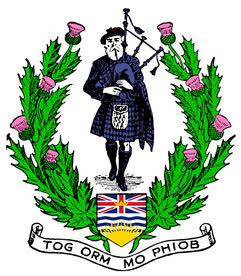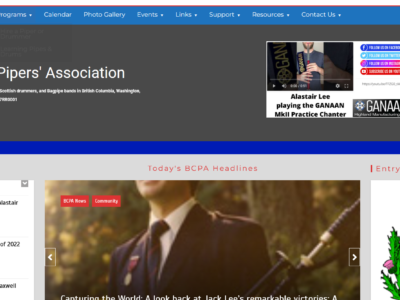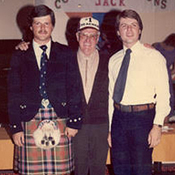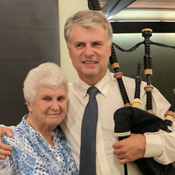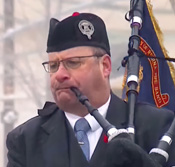Alex Galloway
It was a sharp, clear evening outside and a warm, cozy venue inside. Mary and Bob McIlwaine put on a great spread, if one ignores the fact that the oatcake was not Raasay oatcake. Bob has no excuse as he has the recipe that is without an equal.
Alastair Lee led off with MacKay’s Banner, a tune of ancient origin that celebrates a banner that is thought to have been flown by Iain Aberach and his MacKay clansmen at the Battle of Drum na Coup in 1433. Iain Aberach was standing in for his stepbrother Niall, 8thChieftain of the Strathnaver MacKays, who, six years earlier, was incarcerated by King James I on Vass Rock. Aberach’s banner is now in the care and custody of the National Museum of Antiquities in Edinburgh. The inscription on the banner is Biodh Treun, that is, Be Valiant. One might speculate that the tune originally would have been relatively simple in structure and that it would have been slowly transformed over the centuries to become the sophisticated, outstanding tune that we hear today.
Annie He followed with The Bicker. Thomas Budd with Lament for Alasdair Dearg MacDonell. Alasdair was a son of Donald Gruamach MacDonald of Laggan and brother of Isabella, wife of Ruaridh Mor MacLeod of Dunvegan. The composer is unknown but may have been a MacCrimmon.
Alex Galloway redeemed himself, at least in part after a long absence, with Lord Lovat’s Lament, composed by Lovat’s piper, David Fraser.
Andrew Lee followed with Lament for the Viscount of Dundee, John Graham of Claverhouse, known by some as the Hammer of the Covenanters. He fell at Killikrankie in 1689 after rejecting advice to stand clear of the Battle because he was considered to be the only hope the Jacobites had in their struggle to overthrow King William III and return James Stuart to the throne.
Ed McIlwaine stepped up to play MacLeod of MacLeod’s Lament and followed with Lament for the Union.
Hal Senyk closed the evening with a variant of The Glen is Mine, of which there are at least four settings. Hal opted for the Peter Reid version which carried the title The Glen is Our Own, and All that it Contains. One can imagine the composer, young Iain MacPhà draig MacCrimmon tramping through Glen Shiel with the Earl of Seaforth, perhaps on the way to Sheriffmuir on a fine day. The scenery is inspiring. A good fight is on the horizon. The world is his oyster. What could be more exhilarating? The tune reflects a joy of living that young Iain was able to portray so musically.
We were pleased to have as our guest Dr. Gary West of Pipeline fame. Gary was in the area to give the Annual St. Andrews and Caledonian Society’s Lecture at SFU’s Harbour Center in downtown Vancouver.
